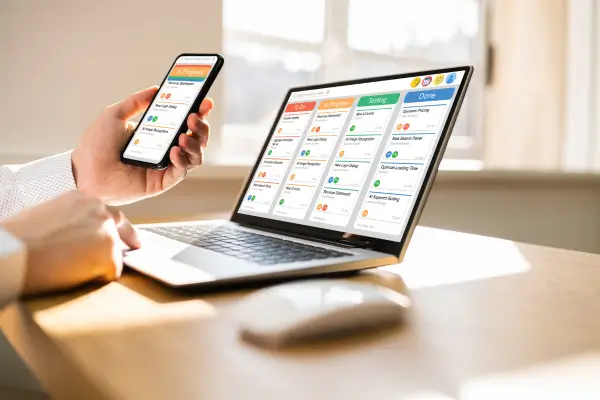Time management is crucial for small business success in 2025. With increasing workloads, mobile apps help streamline tasks and boost productivity.
From scheduling to task tracking, these tools simplify daily operations. They reduce stress and ensure efficient use of time for business owners and teams.
Apps like Todoist, Trello, and Google Calendar keep tasks organized. Others, like RescueTime, eliminate distractions and improve focus.
Choosing the right app depends on your business needs. Prioritize tools that integrate seamlessly into your workflow.
By leveraging time management apps, small businesses can save time, improve efficiency, and focus on growth.
1. Why Time Management Is Critical for Small Businesses
Time is a valuable resource, and poor time management can lead to lost revenue, inefficiencies, and increased stress. Small business owners often handle multiple responsibilities, making it essential to use productivity tools that help:
- Reduce time spent on repetitive tasks.
- Improve team collaboration and efficiency.
- Track and manage work schedules effectively.
- Eliminate distractions and boost focus
Example: A small retail business owner using a scheduling app to automate inventory restocking and staff shift planning can save hours of manual work each week.
Why It Matters: Proper time management tools allow small businesses to maximize efficiency and focus on growth.
2. Best Mobile Apps for Time Management in Small Businesses
Here are some of the most effective time management apps that can help small businesses stay on top of their daily tasks.
A. Todoist – Best for Task Management and Organization
Key Features:
- Organize tasks with due dates and priority levels.
- Assign and delegate tasks to team members.
- Integrates with Google Calendar, Slack, and Outlook
Why It’s Useful:
Todoist is ideal for small business owners who need a simple yet powerful to-do list to stay on track.
B. Trello – Best for Visual Task and Project Management
Key Features:
- Uses a Kanban board system for easy workflow visualization.
- Enables drag-and-drop task management.
- Allows team collaboration on shared boards
Why It’s Useful:
Trello is great for small teams managing projects, marketing campaigns, or client work in an easy-to-follow visual layout.
C. Clockify – Best for Time Tracking and Productivity Monitoring
Key Features:
- Tracks work hours and generates reports.
- Helps monitor billable vs. non-billable hours.
- Works across mobile, desktop, and browser extensions
Why It’s Useful:
Clockify is perfect for freelancers, consultants, and small teams that need accurate time tracking to measure productivity and improve efficiency.
D. Google Calendar – Best for Scheduling and Reminders
Key Features:
- Syncs across devices, ensuring seamless scheduling.
- Sends automatic event reminders and notifications.
- Integrates with Gmail, Zoom, and other business tools
Why It’s Useful:
Google Calendar helps small business owners stay organized, schedule meetings efficiently, and avoid double bookings.
E. RescueTime – Best for Eliminating Distractions and Improving Focus
Key Features:
- Tracks time spent on apps and websites.
- Sends alerts when too much time is wasted.
- Helps create focus-friendly work habits
Why It’s Useful:
RescueTime is ideal for business owners who struggle with distractions and want to optimize their work hours.
F. Slack – Best for Team Communication and Collaboration
Key Features:
- Real-time messaging with file-sharing capabilities.
- Organizes conversations into channels for specific topics.
- Integrates with other tools like Google Drive and Trello
Why It’s Useful:
Slack reduces email overload and improves internal communication, making it easier for teams to collaborate efficiently.
G. Focus@Will – Best for Enhancing Productivity with Music
Key Features:
- Provides scientifically curated music to improve concentration.
- Helps reduce stress and mental fatigue.
- Supports different work styles and focus needs
Why It’s Useful:
Focus@Will is great for business owners who work in distracting environments and need help maintaining deep focus.
3. How to Choose the Best Time Management App for Your Business
Selecting the right time management app depends on your business size, industry, and specific needs. Here’s how to decide:
A. Identify Your Biggest Time Management Challenges
- Do you struggle with task organization? → Use Todoist or Trello.
- Do you need better meeting scheduling? → Use Google Calendar.
- Do you lose track of work hours? → Use Clockify
B. Consider Team Collaboration Needs
- If you manage a remote team, use Slack for communication and Trello for task tracking.
- If you’re a solopreneur, a personal task manager like Todoist may be enough.
C. Focus on Ease of Use and Integration
- Ensure the app syncs across devices and integrates with your existing workflow.
Example: A small law firm can use Clockify for billable hours and Google Calendar for client meetings, ensuring efficient time tracking and scheduling.
Why It Matters: Choosing the right tools helps eliminate wasted time and improve productivity.
4. Common Time Management Mistakes to Avoid
Even with the best apps, poor time management habits can still affect productivity. Here are common mistakes small business owners should avoid:
A. Not Setting Clear Priorities
- Trying to do everything at once leads to inefficiency.
- Use a priority-based task manager like Todoist to focus on high-impact tasks.
B. Overloading Schedules with Unnecessary Meetings
- Too many meetings disrupt work time.
- Use Google Calendar to set structured meeting slots and allow buffer time.
C. Ignoring Distractions and Wasting Time on Low-Value Activities
- Checking social media too often reduces productivity.
- Use RescueTime to track time spent on unproductive activities.
Example: A small marketing agency reducing unnecessary meetings by 50 percent can free up more time for client work, improving efficiency and revenue.
Why It Matters: Avoiding these mistakes helps businesses stay productive and focused on growth.
5. The Future of Time Management Apps for Small Businesses
As technology evolves, time management apps will become smarter and more personalized.
A. AI-Powered Productivity Assistants
- AI will analyze work habits and suggest time management improvements.
- Automated scheduling tools will optimize calendars based on workload and availability.
B. Voice-Activated Task Management
- Virtual assistants like Google Assistant and Siri will help schedule tasks via voice commands.
C. Integration of Productivity and Mental Well-Being
- More apps will combine productivity tracking with stress management features.
Example: A business owner using AI-powered scheduling tools can automate task prioritization, reducing stress and decision fatigue.
Why It Matters: The next generation of time management tools will help small businesses work smarter, not harder.
Conclusion
Essential mobile apps for time management in small businesses are game-changers for productivity and efficiency. Whether you need help with task management, scheduling, communication, or focus, the right apps can streamline operations and save valuable time.
By choosing the right tools and avoiding common productivity mistakes, small businesses can maximize efficiency and stay competitive in 2025 and beyond.



